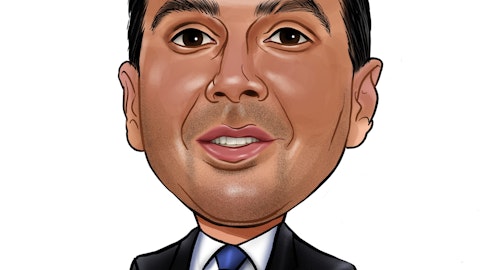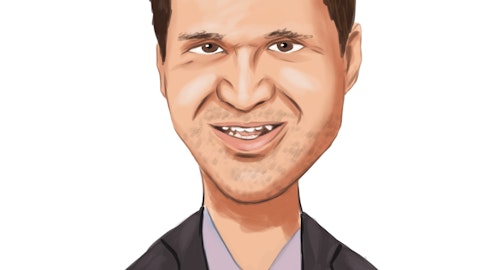And so, from our perspective, we’ll focus on opportunities that we have, and there have been opportunities, and we picked up those third-party management contracts largely due to the success that we’ve been having, and others are seeing it as an opportunity. So, I think we’ll grow there, and we’ll grow with the ROI projects. And if an acquisition comes around, that makes sense for us, particularly one that involves rebranding and one that has — does not have a high percentage of direct sales, those are really the places where we can pull the lever and dramatically change the profit potential of a resort. And I think we’ll get more of those. And so, we think they’ll come. But in the meantime, if we think there’s a disconnect between the value of our underlying business and the stock price, you’ll see us continue to buy back our stock.
Chad Beynon: Thank you very much. Congrats on where the business is trending.
Bruce Wardinski: Okay. Thanks, Chad.
Ryan Hymel: Thanks, Chad.
Operator: Our next question comes from Smedes Rose from Citi. Please go ahead with your question.
Smedes Rose: Hi. Thanks. I just wanted to ask a little bit more about your intention to sell the two Jewel assets that you took back management on. And I guess, sort of specifically, I mean, certainly in the U.S., transaction volume has gotten a lot more challenging. I mean, all the stuff we know about. So, I’m just kind of curious what you think the process is like and who kind of are the buyers for those kinds of assets in this — in the world we’re in right now?
Bruce Wardinski: Sure. No, great question. So first of all, let’s step back and go into the rationale for why we choose to sell versus choose to do something else with them, okay. So, it kind of goes on the last question about kind of the opportunity with share repurchases and with high ROI projects, right? So, to renovate these two hotels, okay, would take a good amount of money and more importantly than the good amount of money, a good amount of time, okay. And then, when you look at the returns that you’ll generate from those, while very attractive, okay, is it better than doing share repurchases or high ROI projects? It’s arguable, right? But the thing is the other opportunities are probably more likely. So, kind of from a risk-adjusted basis, I can look at share repurchases or I can look at these high ROI projects and say, “I’m highly certain my return is going to be outstanding there.” Okay?
On these others, it’s going to be a very good return, but it’s going to take a little time. In a normal world, I would go do that. And that’s historically what we have done, and we’ve done incredibly well. But in kind of this world, I said, “You know what? Why do we need to do that?” And so, if we sell the assets, we’ll get those proceeds, and we can reallocate those proceeds into either share repurchases or high ROI projects. So, I think we’ll generate a higher return by selling. Your — the second point of your question is, who are they and comparing it to the U.S., I think it’s very different than comparing it to the U.S. market. The first big issue with people buying — well, there’s two big issues, I think, in buying hotels in the U.S. Number one is, what are the business prospects of those hotels?





